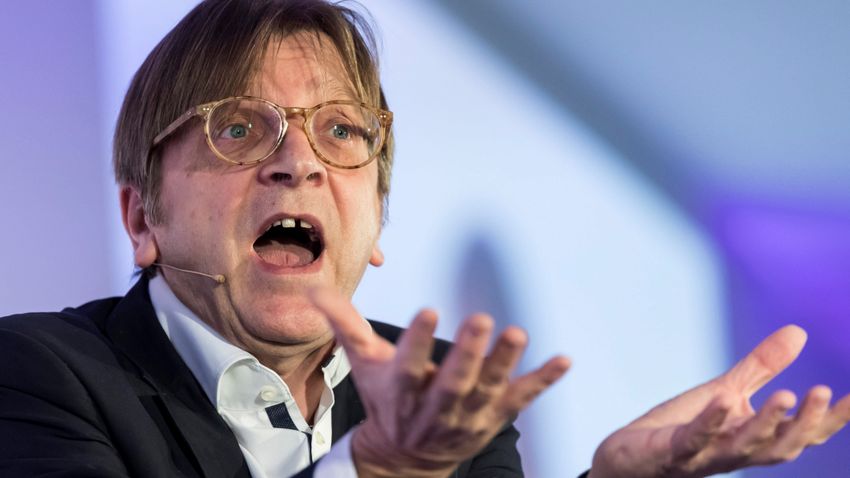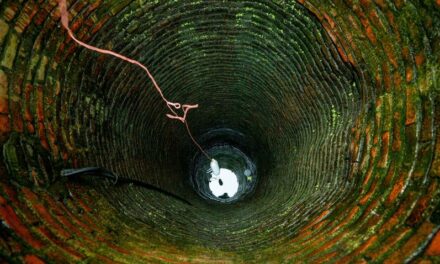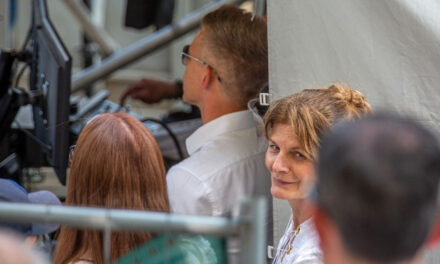Caught in corruption scandals, Guy Verhofstadt leaves the political field.
A luxury villa renovated with public funds, offshore companies, suspicious lobbying activities - the wealthy Guy Verhofstadt accumulated scandal after scandal during his political career. The liberal MEP has now announced that he will not run again in the EP elections in 2024. It is an interesting coincidence that the hypocritical politician, former prime minister of Belgium and liberal member of the European Parliament left the political field just after the outbreak of the Brussels corruption scandal that rocked the European Parliament.
This was reported by the Belgian press on Saturday, after Verhofstadt gave an interview to the newspapers De Tijd and L'Echo.
It seems that the ground has become hot under the Belgian politician's feet, he has fallen into his continuous scandals and suspected cases of corruption.
Verhofstadt, who regularly attacks Hungary, has been involved in countless suspicious cases in recent years, and his hypocrisy has caught the eye of many.
Europeans are suffering from economic difficulties, and Verhofstadt is laughing at them from his luxury villa
It is enough to think about how he campaigned in favor of EU sanctions that battered the European economy and sent inflation and prices skyrocketing, while millions of Europeans were moaning about their economic effects in their daily lives. However, Verhofstadt was not troubled by the skyrocketing prices, as he is a wealthy politician.
Following the research of Transparency International, the newspaper Le Soir already reported in 2018 that the Belgian politician could pocket almost one and a half million euros (that is, more than HUF 500 million) in addition to his monthly salary of 13,000 euros. in the previous European Parliament cycle.
Although MEPs are not prohibited from obtaining such side incomes - as long as they are not hidden from the authorities -, according to the Belgian news portal Brussels Times, Verhofstadt made a remarkably large amount of money in this way.
Transparency International also emphasized that a conflict of interest can easily arise if the representative accepts money from companies that are also on the EU's official list of lobbyists.
Apparently, the liberal politician is not in short supply, which is also clearly shown by the fact that he lives in a beautifully renovated 17th-century riverside heritage building in downtown Ghent, Belgium.
The international news agency V4NA reported last year how Verhofstadt "saved" when renovating his own house. As it turned out, the liberal politician halved his expenses by receiving hundreds of thousands of euros in public funds to renovate his house.
According to press reports, the liberal politician and his family bought the listed building in 2011 - in which he still lives today - for one and a half million euros together with two other families. newspaper Knack, in 2012
the costs of the renovation of the Verhofstadt residence were estimated at roughly 820,000 euros, but nearly half of this was paid for by Belgian taxpayers.
According to information from the Knack news portal, the former prime minister received significant support for the renovation from the Flemish government, the province of East Flanders and the city of Ghent, totaling 327,784 euros.
The city council of Ghent, however, dismissed the criticism by saying that the money was given to the listed building, not the owner, and that the renovation contributes to the development of the townscape. In any case, it is true that the building was uninhabitable before the renovation and conversion, but thanks to the generous support, the Verhofstadts got away with almost half the cost of building their family home.
However, this is not the end of the dubious deals linked to Verhofstadt.
Offshore companies, LNG business, oligarchs
As previously reported , Verhofstadt's name appeared even in the ominous Paradise documents. The database made public in 2017, containing more than 13 million documents, revealed that
the liberal politician was a member of the board of a shipping company - for 60,000 euros a year, or 24 million forints - which tried to evade its tax obligations through an offshore company.
The case swelled into a scandal, and, for example, the chairman of the Belgian Labor Party, Peter Mertens, also criticized Verhofstadt, pointing out that he should have known about the satellite company registered in Bermuda.
Instead of accepting responsibility, Verhofstadt left the matter to his press officer, who came up with the strange explanation that Exmar Offshore is not actually an offshore company, and only has this term in its name because it literally deals with coastal activities.
By the way, Exmar deals with shipping and one of its main profiles is LNG, or liquefied gas, by sea. The company is present in the United States, Europe, the Middle East, and even in the Far East, such as Shanghai and Hong Kong. The largest ship transporting LNG can transport 138,000 cubic meters of energy carrier to its destination, but there are several ports where it can also participate in the business of transforming and storing liquefied gas.
Exmar also writes on its website that the company "has always been the first to adapt to changing situations and to define its own direction by taking a leading role through innovation."
Well, according to the signs, the shipping company is really telling the truth about this, and in fact, it is trying to manage not only its own, but possibly others as well. For example, that of the European Union, where some Brusselsites have been clamoring for years that pipeline natural gas should be discontinued and that European countries should use LNG instead, wrote V4NA in connection with the matter.
They add that Guy Verhofstadt directly demonizes energy carriers transported by wire.
All this is not surprising, since the liberal politician is a connection point between Exmar and Brussels, as Verhofstadt already had an interest in the rise of maritime transport in 2010. Moreover, since then, he has been calmly lobbying for the European Union to force member states to use energy carriers transported by sea. Later, Verhofstadt, famous for corruption scandals and immeasurable wealth, took a step up on the lobby level and loudly protested against the construction of the Nord Stream 2 gas pipeline.
By the way, the unprincipledness of the liberal Verhofstadt is also clearly shown by the fact that
that the shipping company also signed a contract with the largest Russian company, Gazprom - which also happens to directly connect it to Russian President Vladimir Putin. Let's add that this contract was signed by the company at a time when Russia had just annexed the Crimean peninsula.
And Guy Verhofstadt already sat on Exmar's board of directors.
But Verhofstadt's scandalous affairs are still not over, as the liberal politician also lobbies for oligarchs. In particular, he has a close relationship with Nicolas Boëll, who owns the Sofina holding company, which also owns GdF Suez.
Shortly after the latter company wanted to acquire the Thessaloniki waterworks in Greece in 2014, Verhofstadt demanded the privatization package from Greek Prime Minister Alexis Tsipras in the European Parliament.
At the same time, Verhofstadt was also a member of the board of the APG pension fund, and after his speech attacking Tsipras and Greece, three Greek ministers met with the leaders of APG within six months.
American interests and the Brussels corruption scandal
But Guy Verhofstadt was not only able to lobby for the interests of Nicolas Boël in the European Parliament as one of the main figures of the ALDE faction, as he has a famously good relationship with the billionaire speculator oligarch, György Soros, and is considered a reliable ally. He himself reported on his meetings with the American businessman.
However, it caused enormous outrage when it was revealed that the ALDE party family was also financed by multinational corporations such as Monsanto, Microsoft, Google, Uber, Syngenta or Walt Disney, as some of these multinationals are not registered in EU member states, but for example in the United States, Switzerland or various tax haven islands.
This means that non-European Union companies and oligarchs were allowed to interfere in the EP elections, and it is obvious that American companies did not just fund the liberal party family out of goodwill.
It is interesting that Verhofstadt's name came up in connection with the Brussels corruption scandal precisely because of his lobbying activities.
As it turned out , not so long ago, in 2018, Guy Verhofstadt attended a conference in Morocco with Eva Kaili, one of the protagonists of the corruption scandal.
At these meetings, the big guns of the so-called blockchain technology – first developed for cryptocurrencies – bring together various companies, government agencies and start-up entrepreneurs to discuss the most pressing issues of innovation, economic growth and the impact of blockchain technology and digital advance the development of tools.
Not to mention, lobbyists from the tech world also attend these meetings.
It is a particularly interesting coincidence that, after so many scandals, Guy Verhostadt decides to leave the political field just after the Brussels corruption scandal that rocked the European Parliament.
Featured image: MTI/EPA/Alessandro Della Valle













